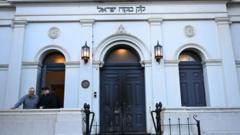In a recent incident, the serene evening at a Melbourne synagogue was shattered when a man reportedly poured flammable liquid on the entrance and ignited a fire, prompting the evacuation of around 20 diners inside, all of whom escaped uninjured. This alarming act of arson is currently under investigation by police, who are also probing its connection to disturbances at a Jewish-owned restaurant in the city on the same evening.
Over the past months, Australia has witnessed a disturbing rise in antisemitic incidents, a situation exacerbated by escalating hostilities between Israel and Hamas. As a direct response to this rising wave of hate crimes, the Australian government has appointed a special envoy to fight against antisemitism and passed tougher legislation aimed at integrating tougher penalties for hate crime perpetrators.
Prime Minister Albanese, emphasizing the unacceptability of antisemitism, assured that those responsible for these acts would face "the full force of the law," while also pledging government support in these endeavors. The connection between the synagogue fire and the unrest at the Miznon restaurant—where rioters shouted slogans against the Israeli military and destroyed property—remains unclear but is indicative of the broader discontent permeating the community.
Alex Ryvchin, co-chief executive of the Executive Council of Australian Jewry, described these events as a significant escalation against the Jewish community. He, along with Israel's Foreign Minister Gideon Saar, expressed urgent concerns regarding the failure to adequately fight against antisemitism in Australia.
The ongoing Israel-Hamas conflict has also polarized communities within Australia, sparking protests from various groups and contributing to a worrisome increase in both antisemitism and Islamophobia. The Egyptian health ministry reports staggering loss of life in Gaza in the wake of ongoing military actions, highlighting the human toll of this geopolitical strife.
Over the past months, Australia has witnessed a disturbing rise in antisemitic incidents, a situation exacerbated by escalating hostilities between Israel and Hamas. As a direct response to this rising wave of hate crimes, the Australian government has appointed a special envoy to fight against antisemitism and passed tougher legislation aimed at integrating tougher penalties for hate crime perpetrators.
Prime Minister Albanese, emphasizing the unacceptability of antisemitism, assured that those responsible for these acts would face "the full force of the law," while also pledging government support in these endeavors. The connection between the synagogue fire and the unrest at the Miznon restaurant—where rioters shouted slogans against the Israeli military and destroyed property—remains unclear but is indicative of the broader discontent permeating the community.
Alex Ryvchin, co-chief executive of the Executive Council of Australian Jewry, described these events as a significant escalation against the Jewish community. He, along with Israel's Foreign Minister Gideon Saar, expressed urgent concerns regarding the failure to adequately fight against antisemitism in Australia.
The ongoing Israel-Hamas conflict has also polarized communities within Australia, sparking protests from various groups and contributing to a worrisome increase in both antisemitism and Islamophobia. The Egyptian health ministry reports staggering loss of life in Gaza in the wake of ongoing military actions, highlighting the human toll of this geopolitical strife.




















